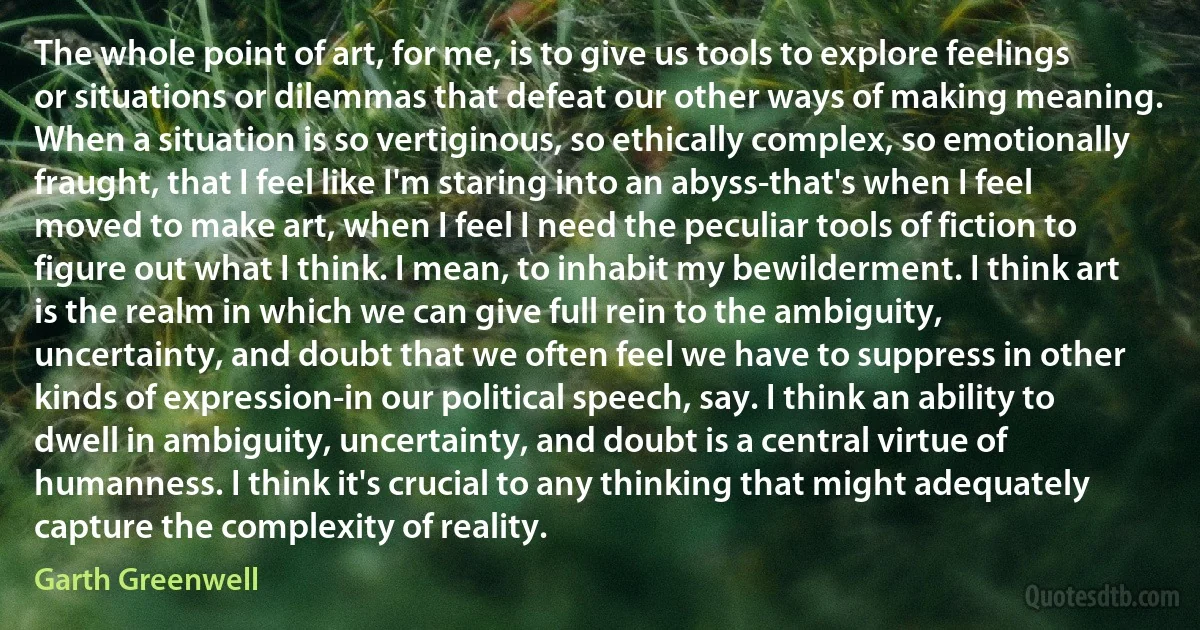
The whole point of art, for me, is to give us tools to explore feelings or situations or dilemmas that defeat our other ways of making meaning. When a situation is so vertiginous, so ethically complex, so emotionally fraught, that I feel like I'm staring into an abyss-that's when I feel moved to make art, when I feel I need the peculiar tools of fiction to figure out what I think. I mean, to inhabit my bewilderment. I think art is the realm in which we can give full rein to the ambiguity, uncertainty, and doubt that we often feel we have to suppress in other kinds of expression-in our political speech, say. I think an ability to dwell in ambiguity, uncertainty, and doubt is a central virtue of humanness. I think it's crucial to any thinking that might adequately capture the complexity of reality.
Garth GreenwellRelated topics
ability ambiguity art bewilderment central complex complexity defeat doubt dwell explore fraught full humanness making might meaning mean need point say situation speech staring thinking think virtue waysRelated quotes
Thus we must carefully distinguish between two kinds of reality, one which has an individual character, and one which has a universal appearance... It is, however, wrong to think that the non-figurative artist finds impressions and emotions received from the outside useless, and regards it even as necessary to fight against them... It is equally wrong to think that the non-figurative artist creates through 'the pure intention of his mechanical process', that he makes 'calculated abstractions' and that he wish to 'suppress sentiment not only in himself but in the spectator'... It is thus clear that he has not become a mechanic, but that the progress of science, of technique, of machinery, of life as a whole, has only made him into a living machine, capable of realizing in a pure manner the essence of art.

Piet Mondrian
The ones that weren't paintable were the ones I did paint. The dead. To start with, I wanted more to paint the whole business, the world as it then was, the living reality – I was thinking in terms of something big and comprehensive. But then it all evolved quite differently, in the direction of death. And that's really not all that unpaintable. Far from it, in fact. Death and suffering have always been an artistic theme. Basically, it's the theme. We've eventually managed to wean ourselves away from it, with our nice, tidy lifestyle... They [ Red Army Faction-members were not the victims of any specific ideology of the left or of the right, but of the ideological posture as such. This has to do with the everlasting human dilemma in general: to work for a revolution and fail..

Gerhard Richter
I remained there [in The Netherlands, 1914-18] for the duration of the war, continuing my work of abstraction in a series of church. facades, trees, houses, etc. But I felt that I still worked as an Impressionist and was continuing to express particular feelings, not pure reality. Although I was thoroughly conscious that we can never be absolutely 'objective', I felt that one can become less and less subjective, until the subjective no longer predominates in one's work. More and more I excluded from my painting all curved lines, until finally my compositions consisted only of vertical and horizontal lines which formed crosses, each separate and detached from the other. Observing sea, sky and stars, I sought to indicate their plastic function through a multiplicity crossing verticals and horizontals.

Piet Mondrian
The worst thing that can happen to advanced devotees who are fixed in Krishna consciousness is that they will go back to the spiritual world. Thus, they are enabled by calamitous situations to go back to Krishna more quickly. It is a part of the process of devotion that from time to time everyone must be tested in various ways. When we take to devotional service we are declaring war against Maya. We are on a battlefield, engaged in our own battle of Kuruksetra. We shouldn't read the Bhagavad-gita and think that it is merely some fascinating ancient history and philosophy. We should also understand that Arjuna is representing every person who is trying to take shelter of Krishna. Arjuna had to undergo bewilderment and serious choices, but Krishna was present to protect him.

Bhakti Tirtha Swami
If Christ were to walk in this world today, do you know what would happen to Him? He would be placed in a mental institution and given psycho-therapy, just as would His Saints. The world would crucify Him today just as it did 2000 years ago, for the world has not learned a thing, except more devious forms of hypocrisy. And what would happen if, in one of my classes at the university, I would one day tell my students that all the learning of this world is of no importance beside the duty of worshipping God, accepting the God-man who died for our sins, and preparing for the life of the world to come? They would probably laugh at me, and the university officials, if they found out, would fire me-for it is against the law to preach the Truth in our universities. We say that we live in a Christian society, but we do not: we live in a society.

Seraphim Rose
